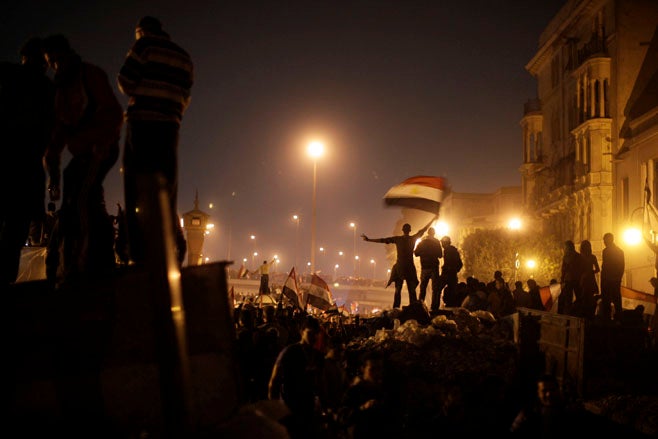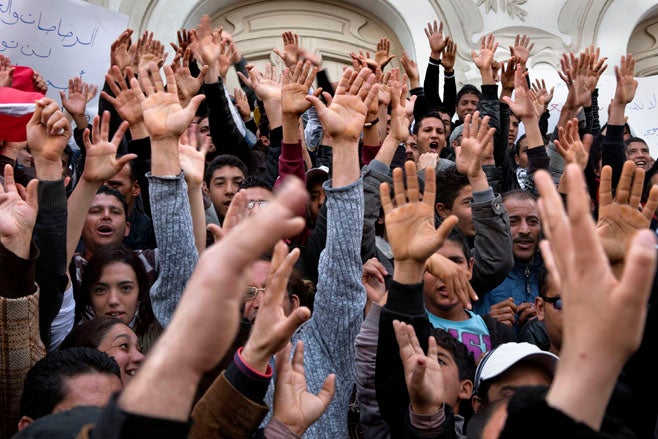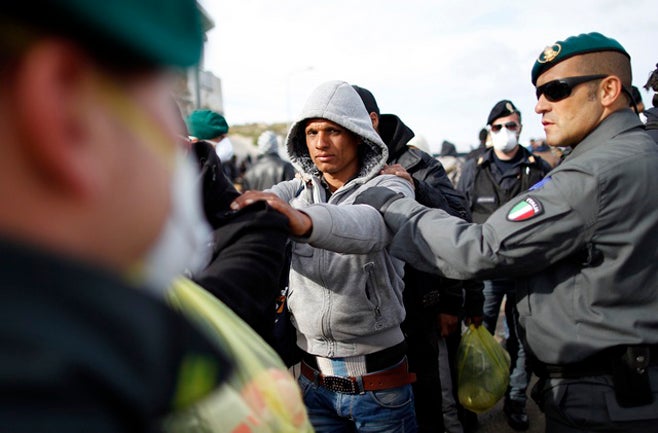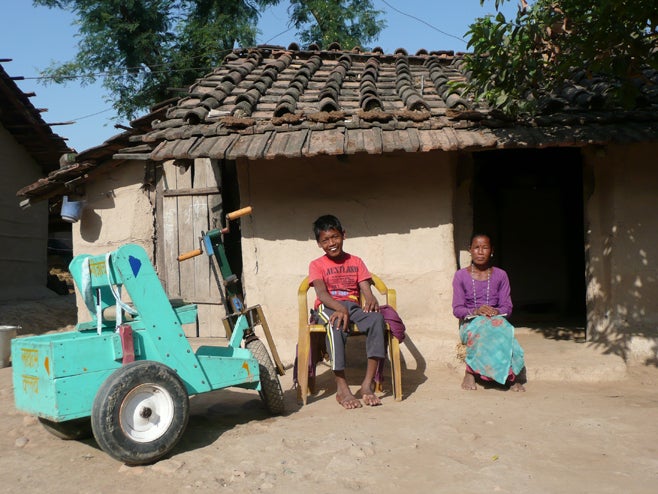Serious human rights violations continued in 2011 in the Occupied Palestinian Territories (OPT). Israeli soldiers used unnecessary lethal force against demonstrators in the Israeli-occupied Golan Heights and across the border in Lebanon. Israeli military attacks in Gaza and policing operations in the West Bank resulted in the deaths of at least 37 civilians.
Israel continued to block exports from, and many imports to, the Gaza Strip, hindering the rebuilding of Gaza’s devastated economy. In the West Bank, including East Jerusalem, Israel demolished a record number of Palestinian homes under discriminatory practices, imposed severe restrictions on Palestinian freedom of movement, continued to build unlawful settlements, and arbitrarily detained peaceful protesters, including children.
Palestinian armed groups in Gaza launched hundreds of rocket attacks at Israeli population centers in 2011, killing two civilians and seriously injuring at least nine others; indiscriminate mortar attacks seriously injured at least four civilians in Israel. Another attack fatally injured an Israeli youth in a school bus. Egyptian attackers whom Israel claimed operated in coordination with armed groups in Gaza crossed the Egyptian border and killed six Israeli civilians.
Hamas authorities carried out three judicial executions in 2011 after unfair military trials, and allegedly tortured scores of detainees, some of whom died in custody.
The Palestinian Authority's (PA) security services arbitrarily detained hundreds of Hamas supporters as well as politically unaffiliated protesters who supported the pro-democracy Arab Spring movements and reconciliation between Hamas and Fatah. The PA also arrested journalists who were critical of the authorities. Credible allegations of torture by the PA's security services continued.
Gaza Strip
Israel
Israel Defense Forces (IDF) conducted attacks on Gaza, including against smuggling tunnels and in response to rocket attacks, that killed 32 Palestinian civilians as of October, the Israeli rights group B’Tselem reported. The cases included civilians killed during aerial and artillery attacks, as well as IDF shootings of Palestinian civilians in the "no-go" zone along Gaza's northern and eastern borders. In April one Israeli aerial attack apparently targeted a Palestinian ambulance, while another aerial attack killed a mother and daughter in an area where no members of armed groups were present. In August an Israeli aerial attack on a sports club that witnesses said was not used for military purposes killed two civilians.
There were no further convictions for laws of war violations during "Operation Cast Lead," which ended in January 2009, despite individual IDF soldiers having allegedly intentionally killed civilians and the widespread, wanton destruction of civilian property. Israel previously convicted only three soldiers for crimes during the conflict, and only one received a prison sentence, for stealing a credit card. Hamas has prosecuted no one for indiscriminate attacks on Israel.
Blockade
Israel's punitive closure of the Gaza Strip, tightened after Hamas's takeover of Gaza in June 2007, continued to have severe humanitarian and economic consequences for the civilian population.
Gaza’s economy grew rapidly, but the World Bank said the growth depended on international assistance. The economy had not returned to pre-closure levels; daily wages, for instance, had declined 23 percent since 2007. Israel’s near-total restrictions on exports from Gaza hindered economic recovery. Due to low per capita income, 51 percent of the population was unable to buy sufficient food, according to UN aid agencies.
Israel allowed imports to Gaza that amounted to around 40 percent of pre-closure levels, the UN reported. Israel continued to bar construction materials, like cement, which it said had “dual use” civilian and military applications. Israel allowed shipments of construction materials for projects operated by international organizations, but as of September Gaza still had an estimated shortage of some 250 schools and 100,000 homes.
A report requested by the UN secretary-general found in September 2011 that Israeli commandos used excessive force in the killing of nine participants in the 2010 “Gaza Flotilla.” The report found that Israel’s naval blockade of Gaza was lawful, but did not address the human rights implications of Israel’s broader closure policy. Israeli officials had justified the closure in part as a means to pressure Hamas to release soldier Gilad Shalit, who was captured in 2006 and was released in October 2011 (see below).
Egypt shared responsibility for the closure of Gaza by restricting the movement of goods and people at the Rafah crossing on Gaza's southern border. In late May Egypt announced it would allow up to 400 Gaza residents to enter Egypt per day. By August more than 920 people per day crossed Rafah in both directions, compared to 1,320 people per day when the crossing was last fully operational in 2006. However, Egyptian border authorities continued to require Palestinians to present official identification cards, which cannot be issued without Israeli approval, even for Gaza residents. Egypt did not permit regular imports or exports through Rafah; in 2005 up to 8,600 truckloads of goods per month entered Gaza from Egypt.
“No-Go” Zone
Israeli forces regularly shot at Gaza residents up to 1.5 kilometers from the armistice line between Gaza and Israel, creating a "no-go" zone that comprises 35 percent of Gaza's agricultural land, according to the UN. The Israeli navy shot at and confiscated Palestinian fishing boats that sailed more than two nautical miles from the coast, prohibiting access to some 85 percent of Gaza's maritime area. In August Israel notified Gaza fishermen that they could retrieve dozens of confiscated boats at the Kerem Shalom land crossing, but delivered the boats without their equipment and demanded payment for transporting them; the fishermen refused.
Hamas
Palestinian armed groups launched 316 rockets at Israeli population centers in 2011, as of November 8, up from 236 rockets in all of 2010. In April Hamas’s armed wing claimed responsibility for an attack, which Israel said involved an antitank missile, on an Israeli school bus, fatally injuring a 16-year-old boy. In August armed groups launched scores of rocket attacks that seriously injured at least five people and killed a man in Beer Sheva. An Ashkelon man was killed by shrapnel from a rocket in October.
The Hamas Interior Ministry carried out three judicial death sentences. Hamas executed, by hanging, a father and son convicted of murder and collaboration with Israel. Abd al-Karim Shrair was executed by firing squad, following an unfair military court trial for collaboration that did not address evidence that security forces had tortured him.
The internal security service of the Interior Ministry and Hamas police in Gaza allegedly tortured 102 people as of September, according to complaints received by the Independent Commission for Human Rights (ICHR), a Palestinian rights body. In April Hamas authorities arrested ‘Adel Razeq, 52, without a warrant, denied his family access to him in detention, and allegedly tortured him to death. The ICHR received 163 complaints of arbitrary arrest by Hamas security forces.
On October 18 Hamas released Israeli soldier Gilad Shalit in exchange for 477 Palestinian prisoners, many of whom had been convicted for attacks on Israeli civilians, and another 550 prisoners whom Israel released in December. Hamas had subjected Shalit to cruel and inhuman treatment that may amount to torture by having refused to allow him to communicate with his family or receive visits by the International Committee of the Red Cross.
Hamas police and internal security forces assaulted, arbitrarily detained, and allegedly tortured civil society activists and peaceful protesters who had sought to demonstrate in solidarity with Egyptian and Syrian protesters and had called for an end to the political split between Hamas and its rival, Fatah.
Hamas’s Interior Ministry closed several NGOs in Gaza, including the Sharek Youth Forum. In August the Education Ministry banned eight secondary-school students from traveling to the United States, where they had won scholarships. Hamas banned three newspapers printed in the West Bank from distribution in Gaza. Police harassed people for so-called morality offenses, including male hairdressers who cut women’s hair, and confiscated “immoral” novels.
West Bank
Palestinian Authority
Complaints of torture committed by West Bank PA security services decreased slightly compared to the same period last year, with the ICHR receiving 91 complaints as of September. PA courts have not found any security officers responsible for torture, arbitrary detention, or prior cases of unlawful deaths in custody. The ICHR received 479 complaints of arbitrary arrests by PA security forces. In a positive development, PA military courts implemented a January decision to stop exercising jurisdiction over civilians.
The PA's security services, and men in civilian clothes whom witnesses identified as security employees, arbitrarily prevented or violently dispersed numerous nonviolent protests during the year and assaulted and arbitrarily detained journalists covering the incidents. PA security officials also arbitrarily arrested and detained, confiscated equipment from, and physically abused journalists perceived to be critical of the PA or supportive of Hamas. In several cases, security officials ignored court orders to release detained journalists.
Palestinian civilians injured 29 settlers in the West Bank and killed seven as of November, the UN reported. In September Israeli police concluded that a father and son from the settlement of Kiryat Arba died in a car crash because Palestinians had thrown rocks at their car. In August an Israeli military court convicted a Palestinian man for killing five members of the Fogel family in the Itamar settlement in March; a second man plead guilty to murder charges in the case in October.
Israel
Israeli forces in the West Bank killed at least five Palestinian civilians as of October. After the end of an arrest operation, soldiers fatally shot two men while they were standing with a group of demonstrators who were throwing stones, B’Tselem reported. In another case, a soldier shot and killed an unarmed resident of Qusra who was protesting against settler incursions on village lands. Soldiers shot and killed an unarmed 66-year-old man in his bed after mistakenly entering his home in search of a suspected Hamas member, according to Palestinian rights groups and international media reports.
The Israeli government generally took no action against Israeli settlers who destroyed or damaged mosques, homes, olive trees, cars, and other Palestinian property, or physically assaulted Palestinians. In January a settler shot and killed a 15-year-old boy near the Palestinian village of Safa; in September a settler killed an 8-year-old Palestinian boy in a hit-and-run incident near Hebron. As of October 31 the UN reported 377 attacks by settlers that damaged Palestinian property, including almost 10,000 olive trees, and injured 167 Palestinians. On average Israeli authorities indict only nine percent of the settlers whom police investigate for attacking Palestinians or damaging Palestinian property, according to the Israeli rights group Yesh Din.
Settlement Building, Discriminatory Home Demolitions, and Evacuations
As of November 1, Israeli authorities had demolished 467 Palestinian homes and other buildings in the West Bank (including East Jerusalem), displacing 869 people, a rate that means Israel will have forcibly displaced more West Bank Palestinians in 2011 than during any year since the UN started collecting cumulative figures in 2006.
Israel usually carries out demolitions on the grounds that the structures were built without permits, but in practice such permits are almost impossible for Palestinians to obtain in Israeli-controlled areas, whereas a separate planning process available only to settlers grants new construction permits much more readily.
The Israeli NGO Peace Now reported that from October 2010, when Israel ended its temporary settlement “building freeze,” to July 2011 construction began on 2,598 new settlement homes, and another 2,149 new homes were completed.
Settlers also continued to take over Palestinian homes in East Jerusalem, based in part on laws that recognize Jewish ownership claims there from before 1948 but bar Palestinian ownership claims from that period in West Jerusalem.
Freedom of Movement
Israel maintained onerous restrictions on the movement of Palestinians in the West Bank, especially in "Area C," which is under exclusive Israeli control. It maintained more than 520 checkpoints and other closure obstacles as of July.
Israel continued construction of the wall or separation barrier around East Jerusalem. Some 85 percent of the barrier's route falls within the West Bank, placing many settlements on the "Israeli" side of the barrier. The barrier led to the confiscation of private land and separated many Palestinian farmers and pastoralists from their lands.
Arbitrary Detention and Detention of Children
Israeli military justice authorities arbitrarily detained Palestinians who advocated non-violent protest against Israeli settlements and the route of the separation barrier. In January a military appeals court increased the prison sentence of Abdallah Abu Rahme, from the village of Bil’in, to 16 months in prison on charges of inciting violence and organizing illegal demonstrations, largely on the basis of coerced statements of children.
In a positive development, in September the Israeli military issued an order raising the age of majority for Palestinians to 18 years; previously 16 and 17-year-olds had been treated as adults under the security regime. Human rights groups reported, however, that Israeli authorities continued to sentence Palestinians according to their age at the time of sentencing even if they were children at the time of the offense, and documented cases in which Israeli authorities arrested children in their homes at night, at gunpoint, questioned them without a family member or a lawyer, and coerced them to sign confessions in Hebrew, which they did not understand.
As of September 31 Israel detained 164 Palestinian children under 18-years-old, and also held 272 Palestinians in administrative detention without charge; Israel released at least 9 administrative detainees, but no children, in the prisoner exchange.
Israel
In May and June Israeli forces used lethal force against demonstrators, reportedly killing 35, across the northern border in Lebanon and in the Israeli-occupied Golan Heights. Protesters threw rocks over a high border fence in Lebanon, and some protesters entered the Israeli-occupied Golan, but witnesses said the demonstrators posed no threat to the soldiers’ lives.
The Israeli parliament passed legislation penalizing calls for boycotts of Israeli settlements. Another new law allows “admissions committees” to screen applicants who wish to move to small communities on the basis of vague “suitability” criteria; the law circumvents a Supreme Court prohibition on housing discrimination against Palestinian citizens of Israel. A third new law penalizes cultural, academic, or other institutions or municipalities that commemorate the Nakba (catastrophe), the Palestinian term for the dispossession and flight of Palestinians around Israel’s founding.
Bedouin citizens of Israel suffered discriminatory home demolitions. The Israel Land Administration repeatedly demolished dwellings in the Bedouin village of Al-Araqib, and confiscated the personal belongings of residents who attempted to hide in a cemetery. At the time residents were contesting in court the state's claims that they had never owned lands in the area. Some 90,000 Bedouin live in "unrecognized" villages with no basic services and at risk of demolitions. In September the Israeli government adopted a plan that reportedly recommended the transfer of up to 30,000 Bedouin from the “unrecognized” villages to other townships. Israel has retroactively legalized large, Jewish-owned, private farms in the area.
There are an estimated 200,000 migrant workers in Israel; employers' withholding of wages and underpayment is reportedly common. Most workers are indebted to recruiting agencies, beholden to a single employer for their livelihood, and are unable to transfer their employment without their employer's consent. Government policies restrict migrant workers from forming families, deporting migrant workers and their children born in Israel.
Israel continued to deny asylum seekers who entered the country irregularly from Egypt the right to a fair asylum process. According to affidavits by soldiers and asylum seekers filed to Israel’s Supreme Court in April and August, Israeli forces continued to forcibly return people to Egypt, which is known to return refugees to countries where they could face persecution and torture. Israeli NGOs said the government failed to ensure access to health screening in detention or upon release for border-crossers, many of whom alleged they were tortured and raped by traffickers in Egypt’s Sinai peninsula.
Key International Actors
Israel has been the largest overall recipient of foreign aid from the US since World War II, receiving US$3 billion in military aid in 2011. In February the US vetoed a United Nations Security Council resolution that sought to reaffirm that Israeli settlements are illegal under international law, even though the US and virtually every other government has found such illegality.
The US continued to train and equip Palestinian security forces and provided $200 million to the PA in budgetary support. In response to the PA’s bid for statehood at the UN in September, as of October the US Congress was blocking $150 million in funding for PA security assistance and $192 million in humanitarian assistance to the West Bank and Gaza. The EU allocated €295 million ($405 million) to the PA for 2011, including for projects in Gaza, as well as €125 million ($172million) tothe UN Relief and Works Agencyfor Palestine Refugees in the Near East(UNRWA).






